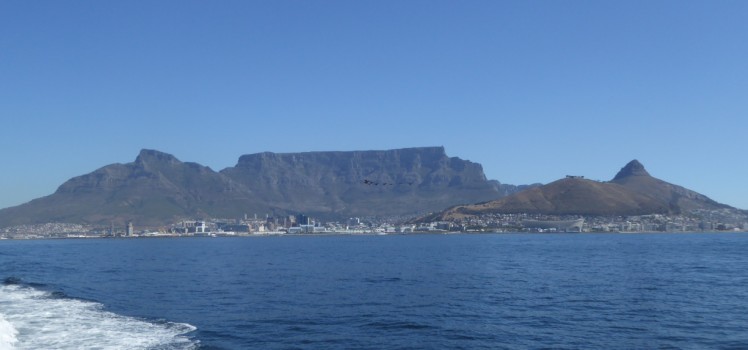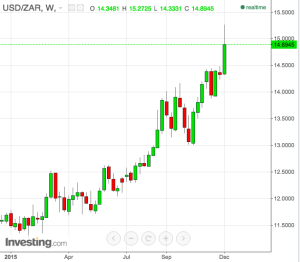South Africa Hits Train Wreck Status

Two weeks ago I traveled to South Africa, in order to create a two-year economic and investment roadmap. After seven days of meetings, I returned with a bearish view for the economy both cyclically and structurally. Unlike previous visits over the past decade, I could find very few glimmers of hope. Gloom is hard to trade on, as the timeframe of my view was that the economy, and all asset classes (bonds, credit, equities and currency), would likely suffer a slow, negative bleed for the next two years. Two years is a long time to run an expensive “short.” However, events over the last few days have put my negative view on fast-forward, and I fear both the economy and South Africa’s investable assets will suffer significantly in the near term. First, on December 4 the country was placed on a negative outlook by S&P and thus faces a new danger of losing its investment grade status in the coming 18 months. However, the real shock came after market close on December 9, when President Zuma announced the sudden dismissal of Finance Minister Nhlanhla Nene, without apparent cause, and the appointment of David Van Rooyen, a politician with little relevant experience.
While it became clear to me through my meetings that South Africa’s investment grade rating would be at risk in the coming six months, I felt there was hope that a downgrade could be postponed – if not avoided. After all, the bastions of economic stability were still in place. In my opinion, South Africa’s National Treasury and the Reserve Bank (the SARB) have ranked among the highest in the emerging markets (or even developed markets) in terms of institutional independence from political manipulation. During the trip, my conviction in the SARB was reinforced, as the leaders are stalwart in their orthodox inflation-targeting framework. However, for the first time since I began covering or investing in South Africa (in 1995), I became seriously worried about the ability of the Finance Minister to withstand pressures to maintain spending limits and keep the national debt under 50% of GDP. Now this worry seems almost irrelevant. The lack of process followed in Nene’s removal, alongside small faith that a politically appointed minister with little experience in managing public finances can withstand the ruling party’s crony spending methods of governing, should sound major warning sirens to investors.
The country is already at a critical junction, as the South African economy is cyclically experiencing a perfect storm. It is heavily reliant on its commodity sector, which has been in a five-year decline, thanks to both global and local factors. Second, as a net borrower of capital, South Africa is facing a tighter market for credit (and higher rates) as the Federal Reserve is about to embark on a hiking cycle. In addition, the country is facing a significant drought, and a decaying electricity system that is likely to fail once winter heating demands surface next May. Finally, and most importantly, the economy has been so weak, and the political leadership so non-existent, that with no structural reforms in years, the country is slipping into a welfare state. The size of the government has exploded, and a large part of the population is dependent on welfare checks in order to survive. Youth unemployment is 50%, and overall unemployment is over 25%. Without these government transfers, I imagine social unrest would become a serious threat.
 Now, with the weakening economy, I’m sure Finance Minister Van Rooyen will be pushed to borrow more in order to spend more, but unlike ex-Finance Minister Nene, he might not resist. Bond yields will rise immediately, as markets will not give the benefit of the doubt to an untried minister. The currency will weaken, as investors exit South African investments and/or place negative bets via this relatively liquid and free floating asset. Interest rates could rise dramatically, if pressure on the currency leads the central bank to hike faster and in larger moves in order to keep inflation expectations in check. Equity markets, already facing a weakening economy, will suffer as business confidence will likely plummet.
Now, with the weakening economy, I’m sure Finance Minister Van Rooyen will be pushed to borrow more in order to spend more, but unlike ex-Finance Minister Nene, he might not resist. Bond yields will rise immediately, as markets will not give the benefit of the doubt to an untried minister. The currency will weaken, as investors exit South African investments and/or place negative bets via this relatively liquid and free floating asset. Interest rates could rise dramatically, if pressure on the currency leads the central bank to hike faster and in larger moves in order to keep inflation expectations in check. Equity markets, already facing a weakening economy, will suffer as business confidence will likely plummet.
While the common man in South Africa may not care about markets, it will be more and more difficult for the government to finance the checks to the unemployed. The weaker economy and lack of longer term initiatives for employment (the education system is truly abysmal) mean government revenues will fall, interest expenses on debt will rise, and there will be less funds for the government to allocate for its friends and for social transfers. The strain on society is bound to increase. All in, much to my sadness, the country appears to be moving from “slow bleed” to “train wreck” status.





